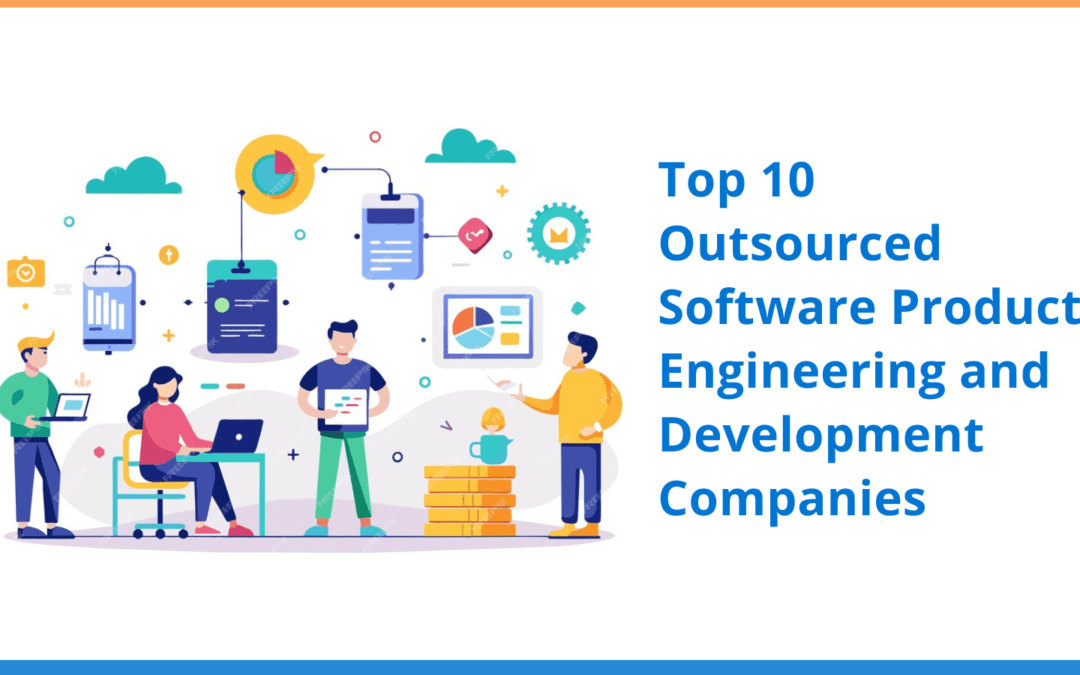In today’s dynamic business landscape, software development is no longer a luxury – it’s a necessity. For many companies, however, building an in-house development team can be a costly and time-consuming endeavor. This is where outsourced software product engineering and development companies come in.
The Rise of Outsourced Software Development

Outsourcing software development offers a compelling alternative, allowing companies to access a global pool of skilled developers, reduce development costs, and accelerate project timelines. This approach has seen a significant rise in popularity, particularly among enterprise companies, startups, and seed-funded ventures.
Benefits of Outsourcing Software Development

There are several key benefits to consider when exploring outsourced software development:
- Cost-Efficiency: Building an in-house team requires significant investment in salaries, benefits, and infrastructure. Outsourcing allows you to tap into a wider talent pool at potentially lower costs.
- Access to Specialized Skills: Finding developers with the exact skillset you need can be challenging. Outsourcing partners often have a wider range of expertise, allowing you to find the perfect fit for your project.
- Scalability: Scale your development team up or down as needed, depending on project requirements. This flexibility is invaluable for startups and businesses with fluctuating workloads.
- Focus on Core Business: By outsourcing software development, you free up internal resources to focus on your core business activities.
Challenges and Considerations

While outsourcing offers numerous benefits, it’s not without its challenges. Potential drawbacks include:
- Communication Barriers: Time zone differences and cultural nuances can create communication difficulties.
- Quality Control: Ensuring the quality of the delivered product requires careful selection of an outsourcing partner and a robust project management strategy.
Mitigating Challenges:
Here are a few tips to mitigate these challenges:
- Clearly Define Requirements: Clearly defined project requirements and expectations upfront are crucial for successful collaboration.
- Choose the Right Partner: Invest time in researching and selecting a reputable outsourcing partner with a proven track record and experience in your industry.
- Effective Communication: Establish clear communication channels and maintain regular progress updates with your development team.
Top 10 Outsourced Software Product Engineering and Development Companies
Now that you understand the advantages and considerations of outsourcing software development, let’s explore some of the leading companies in this space. It’s important to note that this list is not exhaustive, and the “best” partner will depend on your specific project needs and priorities.
Selection Criteria:
The following factors were considered when selecting these top 10 companies:
- Expertise: Experience in various development methodologies (Agile, Waterfall etc.) and technologies (web, mobile, cloud etc.)
- Client Reviews: Positive client testimonials and a strong reputation in the industry.
- Industry Focus: Experience working with companies in your specific industry can be beneficial.
- Company Size and Location: Consider the size and location of the company to ensure a good fit for your project and communication needs.
- EmbarkingOnVoyage: Empower your business with innovative solutions and exceptional results. EOV bridges the gap between services and products, guiding you through the ever-evolving digital landscape. Let’s embark on your voyage to success together.
Ready to set sail? Contact us today to discuss your project and explore how EOV can help you achieve your goals.
- Intellectsoft: A global IT consultancy with expertise in custom software development, enterprise solutions, and cloud migration.
- Instinctools: A software product development company offering a global delivery model to reduce costs and accelerate time-to-market.
- Qubit Labs: A software development company specializing in building complex web and mobile applications, with a focus on innovation.
- Azumo: A software development company with a focus on emerging technologies like blockchain and artificial intelligence.
- SumatoSoft: A software development company with over 10 years of experience working with startups and large corporations.
- ScienceSoft: A software development company with a proven track record in custom software development, web and mobile app development, and quality assurance.
- TatvaSoft: A global IT services company offering a wide range of software development services, including web, mobile, and cloud solutions.
- Enlab Software: A software development company specializing in building custom software solutions for complex business challenges.
- Yalantis: A software development company with expertise in web and mobile app development, as well as user experience (UX) design.
Additional Considerations for Choosing an Outsourced Partner
- Cultural Fit: Look for a partner with a similar work ethic and communication style to ensure smooth collaboration.
- Security and Data Protection: Ensure the outsourcing partner has robust security measures in place to protect your data and intellectual property.
- Pricing Model: Compare pricing models (fixed cost, hourly rate) and choose one that aligns with your project budget and goals.
- Scalability: Consider the partner’s ability to scale their team up or down as your project requirements evolve.
- Client References: Request client references and conduct due diligence to understand the partner’s experience and reputation.
Conclusion
By understanding the benefits and challenges of outsourced software development, and carefully selecting the right partner, companies of all sizes can leverage this approach to achieve their software development goals.
This can lead to faster time-to-market, reduced costs, and access to a wider talent pool.
Additional Resources:
- 10 Benefits of Custom Software Development for Your Business Growth
- Top 15 Web App Development Companies in 2024

